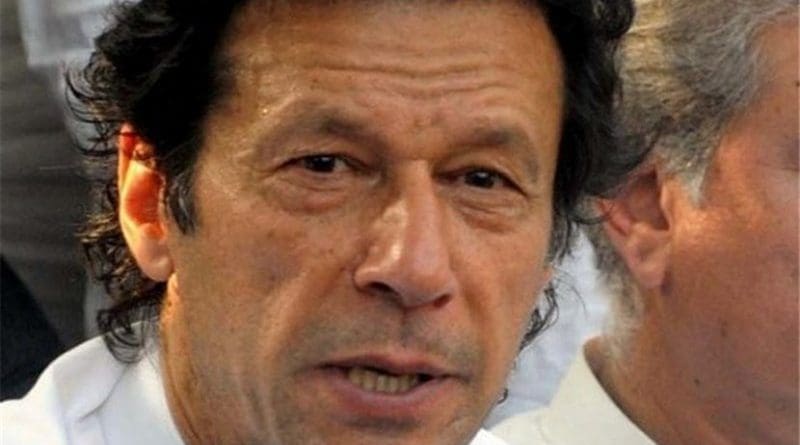Setback For Imran’s Game: Pakistan’s Democracy In A Melting Pot – OpEd
By K.M. Seethi
The verdict of the Supreme Court of Pakistan on Imran Khan’s slapdash game in the National Assembly (NA) on 3 April has come as a real kick in the ball for the captain of Pakistan Tehreek-e-Insaf (PTI) government. The apex court ruled on Thursday evening that the deputy speaker’s decision to reject the no-trust resolution against Prime Minister Imran and the dissolution of the NA by the President was unconstitutional. The five-member constitutional bench unanimously set aside (5-0) the deputy speaker’s ruling, saying that it was “contrary to the Constitution and the law and of no legal effect.” The court said that the prime minister could not have advised the president to dissolve the NA as he “continues to remain under the bar imposed under clause (1) of Article 58 of the Constitution.” By declaring that the NA “was in existence at all times, and continues to remain and be so,” the order reinstated the prime minister and his cabinet in their position. More importantly, the apex court ordered for the session of the National Assembly to reconvene on Saturday saying that the session cannot be prorogued without the conclusion of the no-trust motion against Prime Minister Imran Khan.
The verdict also “clarified that nothing in this short order shall affect the operation of Article 63A of the Constitution and consequences thereof in relation to any member of the Assembly if he votes on the Resolution or (if such be the case) the election of a Prime Minister thereafter in such manner as is tantamount to his defection from the political party to which he belongs within the meaning of the said Article.” A five-member constitutional bench comprised of Chief Justice Bandial, Justice Ijazul Ahsan, Justice Mazhar Alam Miankhel, Justice Munib Akhtar, and Justice Jamal Khan Mandokhail. The apex court’s ruling has been welcomed by the opposition parties.
Curiously, Justice Bandial also brought up the Sri Lankan crisis in the course of the hearing and reminded that the country didn’t even have money for electricity and other basic facilities. He said: “Today, the value of rupee against the dollar has reached Rs190 (in Pakistan). We need a strong government. This will be a very difficult task for the opposition leader.” However, Shehbaz, the opposition leader, pleaded for the restoration of the NA.
Though the verdict has come like a new lease of life for democracy, one does not know if Imran is going to have to bust the opposition’s butt. Imran had indeed lost the confidence of the NA much before 3 April and he would have been constitutionally voted out of power if the no-confidence motion was taken up. But he played an uncouth game by deploying the deputy speaker to stage-manage things, and the President gave in to Imran’s ill-considered advice.
In fact, Imran has been quite unpopular for the last two years with people across a wide political spectrum accusing him of making their living conditions so pitiable. His ‘Naya Pakistan’ has turned out to be a mere hoax. Though the opposition remained united on this question (of removal of Imran), they were equally apprehensive about the role of the military. But the military has apparently taken a near-neutral stand albeit watching the developments closely. Despite all clamour for regime change, Imran stood firm using a ‘foreign ploy’ to remove him. He even showed a ‘letter’ from a Pakistani diplomat arguing that Washington was ‘engineering’ a plan to oust his government. The conspiracy theory, however, did not find many takers and Washington itself turned down such allegations.
Imran Khan’s game of externalizing the internal problems of Pakistan already put him on a tight diplomatic rope walking. Islamabad’s relations with the West and its West Asian allies have seen a downward swing during the last few months. Pakistan’s trade and commercial transactions with them have been in jeopardy with the onset of global recession and the ongoing pandemic. After the withdrawal of the Western forces from Afghanistan, Imran also sought to play a different sort of game seeking a reconfiguration of the regional security architecture. It’s as part of that larger game that he visited Moscow, on the day Putin ordered his troops to invade Ukraine. Imran knows that as long as China is with Islamabad, he has an effective bargaining chip to take up any gauntlet.
However, the intervention of the Supreme Court has come as a relief to all democratic forces. They know that an independent judiciary is a sine qua non for democracy. They also know that the judiciary in Pakistan has had a mixed record. It has repeatedly legitimized military interventions in politics and endorsed constitutional amendments that fundamentally altered the legal and political system and undermined its own independence. But on many other occasions, the judiciary performed itself well, upheld the rule of law, defended civil liberties, and contributed to breaking political deadlocks. With the latest apex court order, the democratic apparatus of Pakistan has been removed from the ventilator. However, it remains to be seen whether the country will witness new game plans from the captain to put the country back to uncertainties and turmoil.

